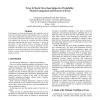Free Online Productivity Tools
i2Speak
i2Symbol
i2OCR
iTex2Img
iWeb2Print
iWeb2Shot
i2Type
iPdf2Split
iPdf2Merge
i2Bopomofo
i2Arabic
i2Style
i2Image
i2PDF
iLatex2Rtf
Sci2ools
HICSS
2000
IEEE
2000
IEEE
Trust is Much More Than Subjective Probability: Mental Components and Sources of Trust
In this paper we claim the importance of a cognitive view of trust (its articulate, analytic and founded view), in contrast with a mere quantitative and opaque view of trust supported by Economics and Game Theory (GT). We argue in favour of a cognitive view of trust as a complex structure of beliefs and goals, implying that the trustor must have a “theory of the mind” of the trustee. Such a structure of beliefs determines a “degree of trust” and an estimation of risk, and then a decision to rely or not on the other, which is also based on a personal threshold of risk acceptance/avoidance. Finally, we also explain rational and irrational components and uses of trust.
Biometrics | Cognitive View | HICSS 2000 | Opaque View | Trust |
| Added | 31 Jul 2010 |
| Updated | 31 Jul 2010 |
| Type | Conference |
| Year | 2000 |
| Where | HICSS |
| Authors | Cristiano Castelfranchi, Rino Falcone |
Comments (0)

